Analysis of GATT Articles I & XX under World Trade Organisation Law
VerifiedAdded on 2023/06/11
|10
|2661
|364
Case Study
AI Summary
This case study delves into the intricacies of the World Trade Organization (WTO) law, specifically focusing on the General Agreement on Tariffs and Trade (GATT) Articles I and XX. It examines the legal issues surrounding potential violations of these articles, particularly concerning import charges and internal taxes on tuna products by Norway. The analysis covers the Most Favored Nation (MFN) treatment under Article I and the exceptions to this rule under Article XX, considering aspects like public morality, environmental protection, and fair trade practices. The study concludes by evaluating the applicability of these articles in the given scenarios, determining whether Norway's actions are justifiable under WTO regulations, and highlighting the balance between trade liberalization and legitimate policy objectives.
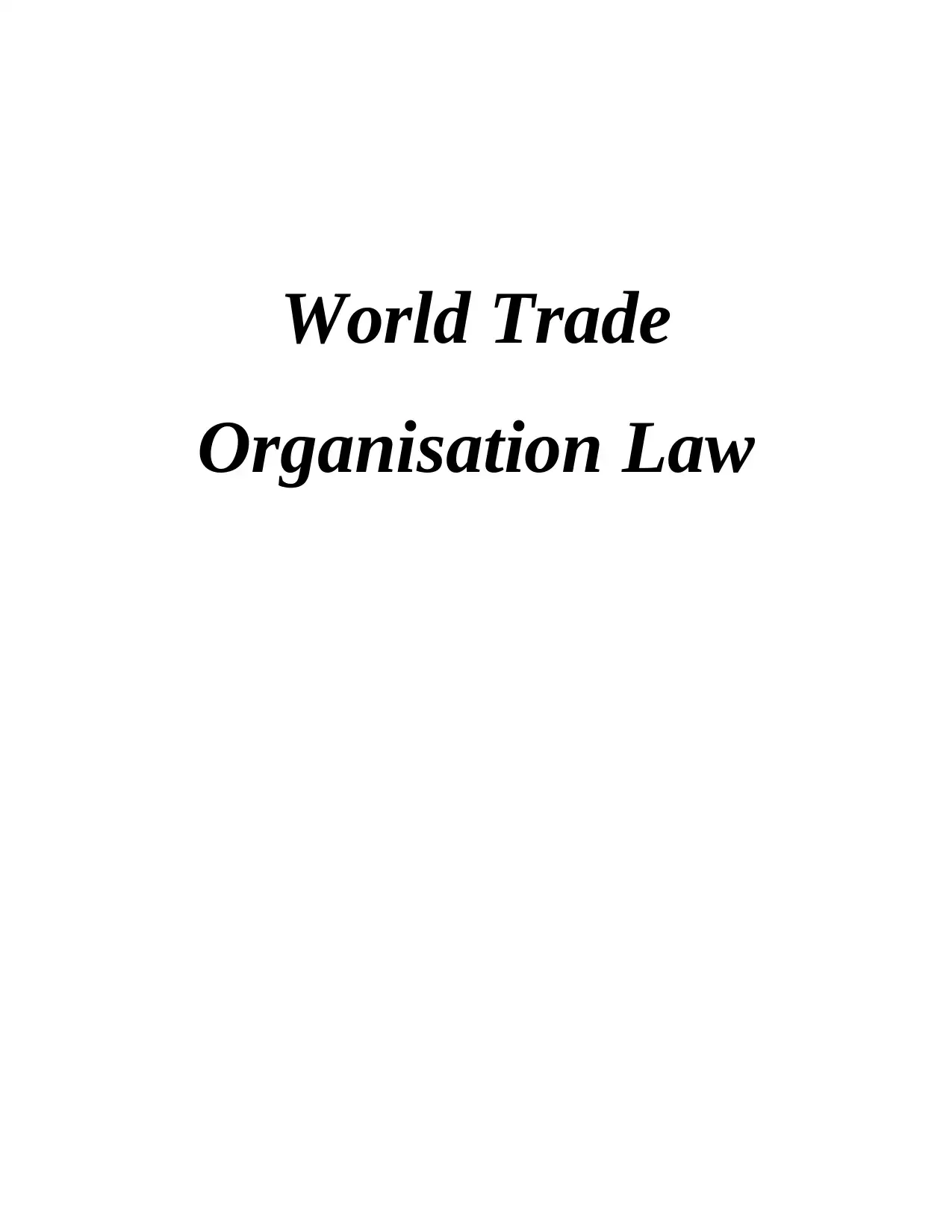
World Trade
Organisation Law
Organisation Law
Paraphrase This Document
Need a fresh take? Get an instant paraphrase of this document with our AI Paraphraser
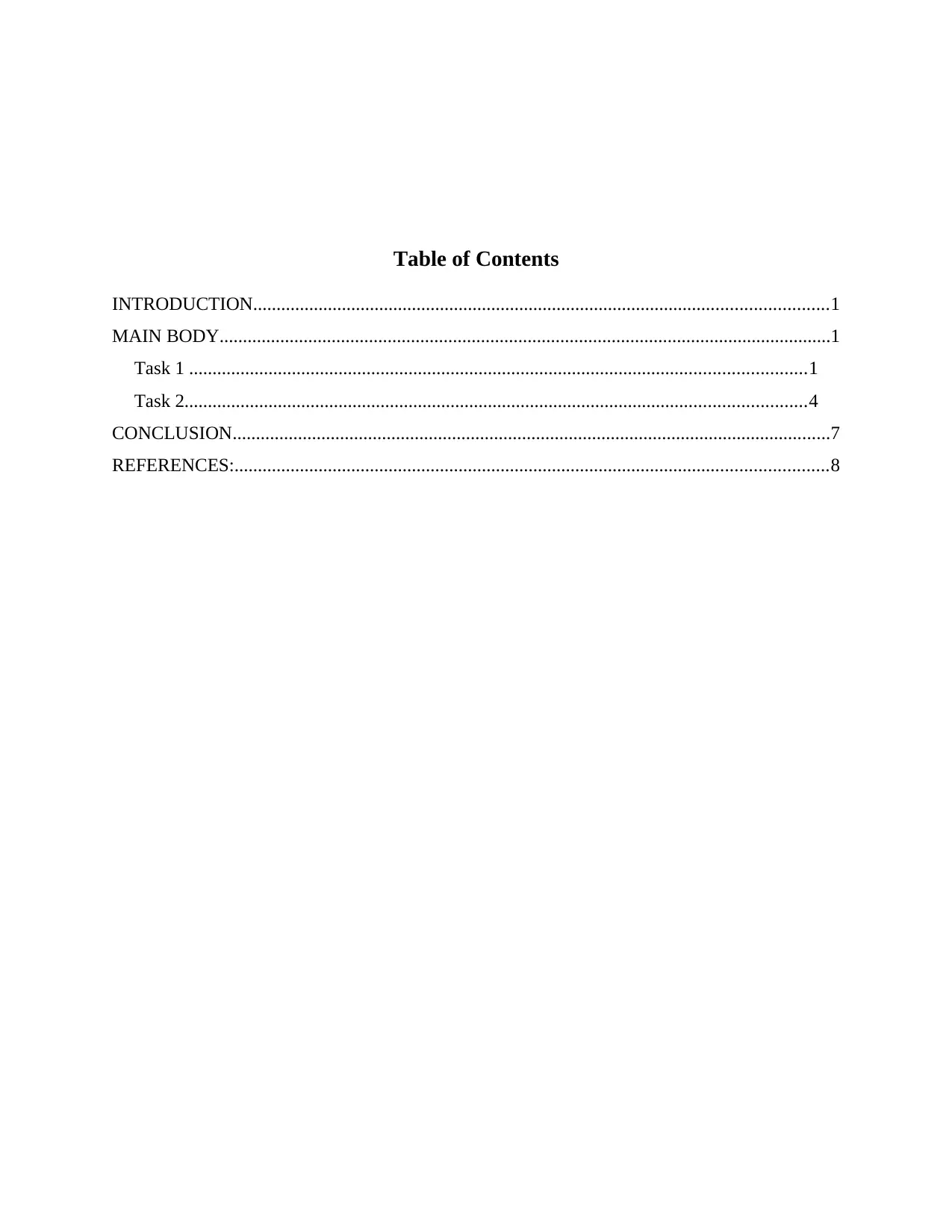
Table of Contents
INTRODUCTION...........................................................................................................................1
MAIN BODY...................................................................................................................................1
Task 1 ....................................................................................................................................1
Task 2.....................................................................................................................................4
CONCLUSION................................................................................................................................7
REFERENCES:...............................................................................................................................8
INTRODUCTION...........................................................................................................................1
MAIN BODY...................................................................................................................................1
Task 1 ....................................................................................................................................1
Task 2.....................................................................................................................................4
CONCLUSION................................................................................................................................7
REFERENCES:...............................................................................................................................8
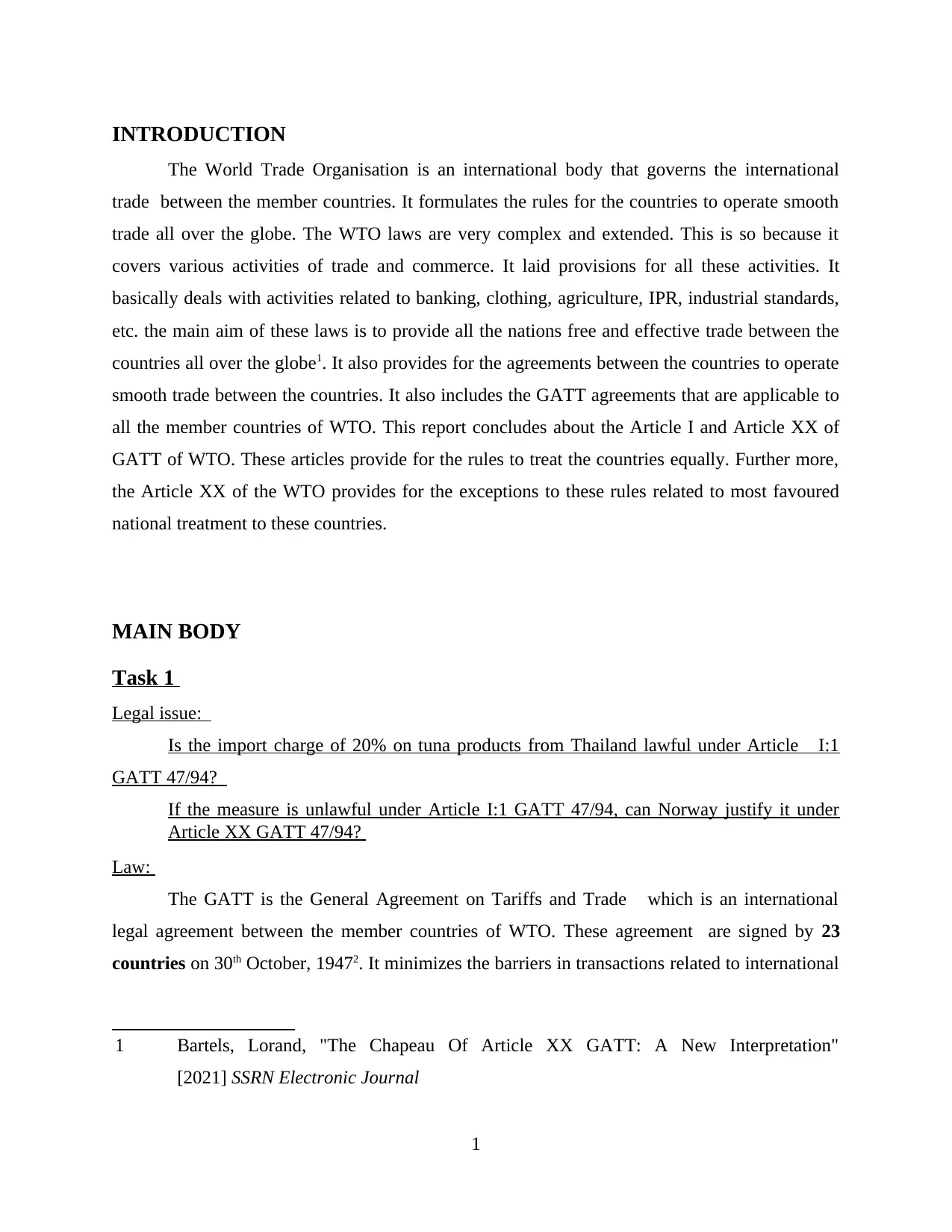
INTRODUCTION
The World Trade Organisation is an international body that governs the international
trade between the member countries. It formulates the rules for the countries to operate smooth
trade all over the globe. The WTO laws are very complex and extended. This is so because it
covers various activities of trade and commerce. It laid provisions for all these activities. It
basically deals with activities related to banking, clothing, agriculture, IPR, industrial standards,
etc. the main aim of these laws is to provide all the nations free and effective trade between the
countries all over the globe1. It also provides for the agreements between the countries to operate
smooth trade between the countries. It also includes the GATT agreements that are applicable to
all the member countries of WTO. This report concludes about the Article I and Article XX of
GATT of WTO. These articles provide for the rules to treat the countries equally. Further more,
the Article XX of the WTO provides for the exceptions to these rules related to most favoured
national treatment to these countries.
MAIN BODY
Task 1
Legal issue:
Is the import charge of 20% on tuna products from Thailand lawful under Article I:1
GATT 47/94?
If the measure is unlawful under Article I:1 GATT 47/94, can Norway justify it under
Article XX GATT 47/94?
Law:
The GATT is the General Agreement on Tariffs and Trade which is an international
legal agreement between the member countries of WTO. These agreement are signed by 23
countries on 30th October, 19472. It minimizes the barriers in transactions related to international
1 Bartels, Lorand, "The Chapeau Of Article XX GATT: A New Interpretation"
[2021] SSRN Electronic Journal
1
The World Trade Organisation is an international body that governs the international
trade between the member countries. It formulates the rules for the countries to operate smooth
trade all over the globe. The WTO laws are very complex and extended. This is so because it
covers various activities of trade and commerce. It laid provisions for all these activities. It
basically deals with activities related to banking, clothing, agriculture, IPR, industrial standards,
etc. the main aim of these laws is to provide all the nations free and effective trade between the
countries all over the globe1. It also provides for the agreements between the countries to operate
smooth trade between the countries. It also includes the GATT agreements that are applicable to
all the member countries of WTO. This report concludes about the Article I and Article XX of
GATT of WTO. These articles provide for the rules to treat the countries equally. Further more,
the Article XX of the WTO provides for the exceptions to these rules related to most favoured
national treatment to these countries.
MAIN BODY
Task 1
Legal issue:
Is the import charge of 20% on tuna products from Thailand lawful under Article I:1
GATT 47/94?
If the measure is unlawful under Article I:1 GATT 47/94, can Norway justify it under
Article XX GATT 47/94?
Law:
The GATT is the General Agreement on Tariffs and Trade which is an international
legal agreement between the member countries of WTO. These agreement are signed by 23
countries on 30th October, 19472. It minimizes the barriers in transactions related to international
1 Bartels, Lorand, "The Chapeau Of Article XX GATT: A New Interpretation"
[2021] SSRN Electronic Journal
1
⊘ This is a preview!⊘
Do you want full access?
Subscribe today to unlock all pages.

Trusted by 1+ million students worldwide
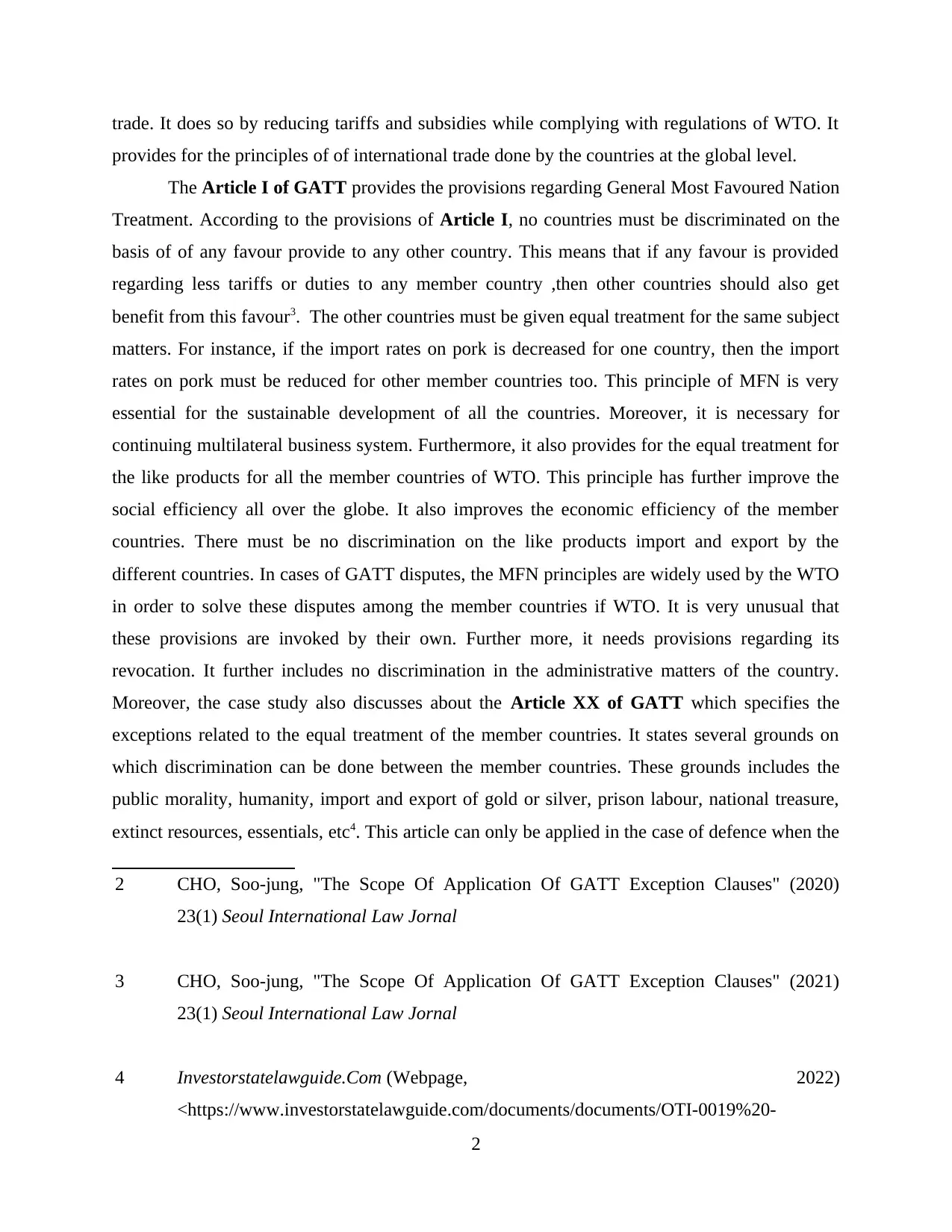
trade. It does so by reducing tariffs and subsidies while complying with regulations of WTO. It
provides for the principles of of international trade done by the countries at the global level.
The Article I of GATT provides the provisions regarding General Most Favoured Nation
Treatment. According to the provisions of Article I, no countries must be discriminated on the
basis of of any favour provide to any other country. This means that if any favour is provided
regarding less tariffs or duties to any member country ,then other countries should also get
benefit from this favour3. The other countries must be given equal treatment for the same subject
matters. For instance, if the import rates on pork is decreased for one country, then the import
rates on pork must be reduced for other member countries too. This principle of MFN is very
essential for the sustainable development of all the countries. Moreover, it is necessary for
continuing multilateral business system. Furthermore, it also provides for the equal treatment for
the like products for all the member countries of WTO. This principle has further improve the
social efficiency all over the globe. It also improves the economic efficiency of the member
countries. There must be no discrimination on the like products import and export by the
different countries. In cases of GATT disputes, the MFN principles are widely used by the WTO
in order to solve these disputes among the member countries if WTO. It is very unusual that
these provisions are invoked by their own. Further more, it needs provisions regarding its
revocation. It further includes no discrimination in the administrative matters of the country.
Moreover, the case study also discusses about the Article XX of GATT which specifies the
exceptions related to the equal treatment of the member countries. It states several grounds on
which discrimination can be done between the member countries. These grounds includes the
public morality, humanity, import and export of gold or silver, prison labour, national treasure,
extinct resources, essentials, etc4. This article can only be applied in the case of defence when the
2 CHO, Soo-jung, "The Scope Of Application Of GATT Exception Clauses" (2020)
23(1) Seoul International Law Jornal
3 CHO, Soo-jung, "The Scope Of Application Of GATT Exception Clauses" (2021)
23(1) Seoul International Law Jornal
4 Investorstatelawguide.Com (Webpage, 2022)
<https://www.investorstatelawguide.com/documents/documents/OTI-0019%20-
2
provides for the principles of of international trade done by the countries at the global level.
The Article I of GATT provides the provisions regarding General Most Favoured Nation
Treatment. According to the provisions of Article I, no countries must be discriminated on the
basis of of any favour provide to any other country. This means that if any favour is provided
regarding less tariffs or duties to any member country ,then other countries should also get
benefit from this favour3. The other countries must be given equal treatment for the same subject
matters. For instance, if the import rates on pork is decreased for one country, then the import
rates on pork must be reduced for other member countries too. This principle of MFN is very
essential for the sustainable development of all the countries. Moreover, it is necessary for
continuing multilateral business system. Furthermore, it also provides for the equal treatment for
the like products for all the member countries of WTO. This principle has further improve the
social efficiency all over the globe. It also improves the economic efficiency of the member
countries. There must be no discrimination on the like products import and export by the
different countries. In cases of GATT disputes, the MFN principles are widely used by the WTO
in order to solve these disputes among the member countries if WTO. It is very unusual that
these provisions are invoked by their own. Further more, it needs provisions regarding its
revocation. It further includes no discrimination in the administrative matters of the country.
Moreover, the case study also discusses about the Article XX of GATT which specifies the
exceptions related to the equal treatment of the member countries. It states several grounds on
which discrimination can be done between the member countries. These grounds includes the
public morality, humanity, import and export of gold or silver, prison labour, national treasure,
extinct resources, essentials, etc4. This article can only be applied in the case of defence when the
2 CHO, Soo-jung, "The Scope Of Application Of GATT Exception Clauses" (2020)
23(1) Seoul International Law Jornal
3 CHO, Soo-jung, "The Scope Of Application Of GATT Exception Clauses" (2021)
23(1) Seoul International Law Jornal
4 Investorstatelawguide.Com (Webpage, 2022)
<https://www.investorstatelawguide.com/documents/documents/OTI-0019%20-
2
Paraphrase This Document
Need a fresh take? Get an instant paraphrase of this document with our AI Paraphraser
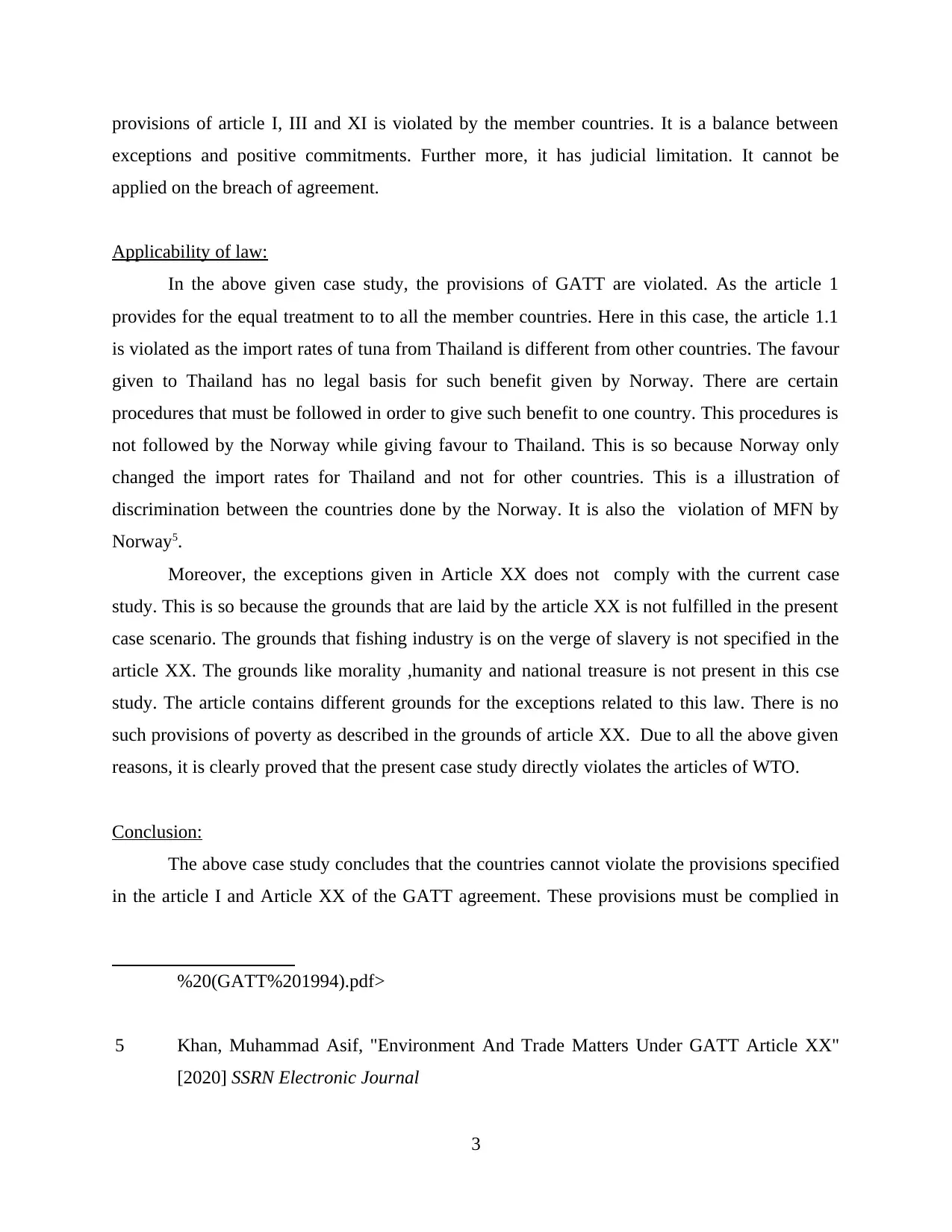
provisions of article I, III and XI is violated by the member countries. It is a balance between
exceptions and positive commitments. Further more, it has judicial limitation. It cannot be
applied on the breach of agreement.
Applicability of law:
In the above given case study, the provisions of GATT are violated. As the article 1
provides for the equal treatment to to all the member countries. Here in this case, the article 1.1
is violated as the import rates of tuna from Thailand is different from other countries. The favour
given to Thailand has no legal basis for such benefit given by Norway. There are certain
procedures that must be followed in order to give such benefit to one country. This procedures is
not followed by the Norway while giving favour to Thailand. This is so because Norway only
changed the import rates for Thailand and not for other countries. This is a illustration of
discrimination between the countries done by the Norway. It is also the violation of MFN by
Norway5.
Moreover, the exceptions given in Article XX does not comply with the current case
study. This is so because the grounds that are laid by the article XX is not fulfilled in the present
case scenario. The grounds that fishing industry is on the verge of slavery is not specified in the
article XX. The grounds like morality ,humanity and national treasure is not present in this cse
study. The article contains different grounds for the exceptions related to this law. There is no
such provisions of poverty as described in the grounds of article XX. Due to all the above given
reasons, it is clearly proved that the present case study directly violates the articles of WTO.
Conclusion:
The above case study concludes that the countries cannot violate the provisions specified
in the article I and Article XX of the GATT agreement. These provisions must be complied in
%20(GATT%201994).pdf>
5 Khan, Muhammad Asif, "Environment And Trade Matters Under GATT Article XX"
[2020] SSRN Electronic Journal
3
exceptions and positive commitments. Further more, it has judicial limitation. It cannot be
applied on the breach of agreement.
Applicability of law:
In the above given case study, the provisions of GATT are violated. As the article 1
provides for the equal treatment to to all the member countries. Here in this case, the article 1.1
is violated as the import rates of tuna from Thailand is different from other countries. The favour
given to Thailand has no legal basis for such benefit given by Norway. There are certain
procedures that must be followed in order to give such benefit to one country. This procedures is
not followed by the Norway while giving favour to Thailand. This is so because Norway only
changed the import rates for Thailand and not for other countries. This is a illustration of
discrimination between the countries done by the Norway. It is also the violation of MFN by
Norway5.
Moreover, the exceptions given in Article XX does not comply with the current case
study. This is so because the grounds that are laid by the article XX is not fulfilled in the present
case scenario. The grounds that fishing industry is on the verge of slavery is not specified in the
article XX. The grounds like morality ,humanity and national treasure is not present in this cse
study. The article contains different grounds for the exceptions related to this law. There is no
such provisions of poverty as described in the grounds of article XX. Due to all the above given
reasons, it is clearly proved that the present case study directly violates the articles of WTO.
Conclusion:
The above case study concludes that the countries cannot violate the provisions specified
in the article I and Article XX of the GATT agreement. These provisions must be complied in
%20(GATT%201994).pdf>
5 Khan, Muhammad Asif, "Environment And Trade Matters Under GATT Article XX"
[2020] SSRN Electronic Journal
3
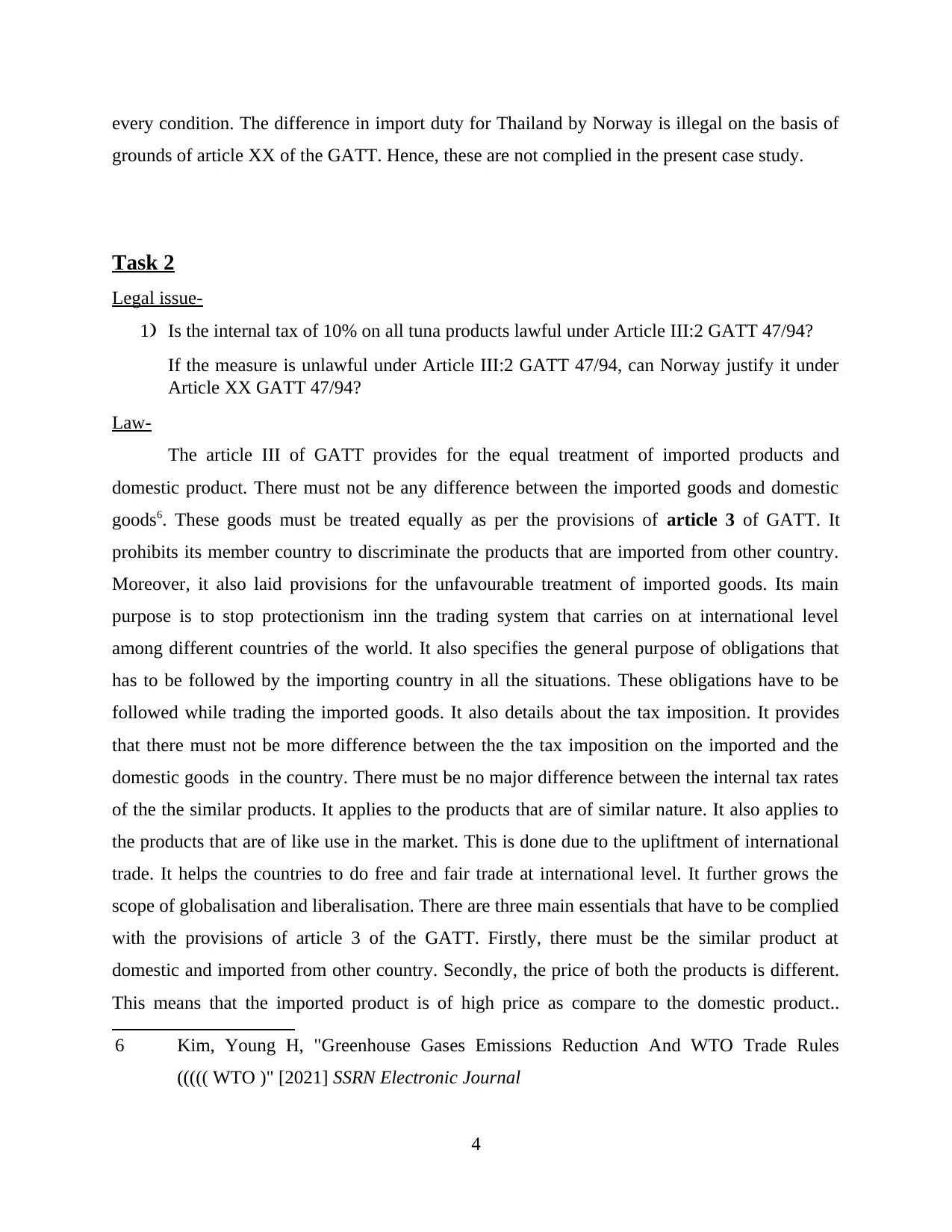
every condition. The difference in import duty for Thailand by Norway is illegal on the basis of
grounds of article XX of the GATT. Hence, these are not complied in the present case study.
Task 2
Legal issue-
1) Is the internal tax of 10% on all tuna products lawful under Article III:2 GATT 47/94?
If the measure is unlawful under Article III:2 GATT 47/94, can Norway justify it under
Article XX GATT 47/94?
Law-
The article III of GATT provides for the equal treatment of imported products and
domestic product. There must not be any difference between the imported goods and domestic
goods6. These goods must be treated equally as per the provisions of article 3 of GATT. It
prohibits its member country to discriminate the products that are imported from other country.
Moreover, it also laid provisions for the unfavourable treatment of imported goods. Its main
purpose is to stop protectionism inn the trading system that carries on at international level
among different countries of the world. It also specifies the general purpose of obligations that
has to be followed by the importing country in all the situations. These obligations have to be
followed while trading the imported goods. It also details about the tax imposition. It provides
that there must not be more difference between the the tax imposition on the imported and the
domestic goods in the country. There must be no major difference between the internal tax rates
of the the similar products. It applies to the products that are of similar nature. It also applies to
the products that are of like use in the market. This is done due to the upliftment of international
trade. It helps the countries to do free and fair trade at international level. It further grows the
scope of globalisation and liberalisation. There are three main essentials that have to be complied
with the provisions of article 3 of the GATT. Firstly, there must be the similar product at
domestic and imported from other country. Secondly, the price of both the products is different.
This means that the imported product is of high price as compare to the domestic product..
6 Kim, Young H, "Greenhouse Gases Emissions Reduction And WTO Trade Rules
((((( WTO )" [2021] SSRN Electronic Journal
4
grounds of article XX of the GATT. Hence, these are not complied in the present case study.
Task 2
Legal issue-
1) Is the internal tax of 10% on all tuna products lawful under Article III:2 GATT 47/94?
If the measure is unlawful under Article III:2 GATT 47/94, can Norway justify it under
Article XX GATT 47/94?
Law-
The article III of GATT provides for the equal treatment of imported products and
domestic product. There must not be any difference between the imported goods and domestic
goods6. These goods must be treated equally as per the provisions of article 3 of GATT. It
prohibits its member country to discriminate the products that are imported from other country.
Moreover, it also laid provisions for the unfavourable treatment of imported goods. Its main
purpose is to stop protectionism inn the trading system that carries on at international level
among different countries of the world. It also specifies the general purpose of obligations that
has to be followed by the importing country in all the situations. These obligations have to be
followed while trading the imported goods. It also details about the tax imposition. It provides
that there must not be more difference between the the tax imposition on the imported and the
domestic goods in the country. There must be no major difference between the internal tax rates
of the the similar products. It applies to the products that are of similar nature. It also applies to
the products that are of like use in the market. This is done due to the upliftment of international
trade. It helps the countries to do free and fair trade at international level. It further grows the
scope of globalisation and liberalisation. There are three main essentials that have to be complied
with the provisions of article 3 of the GATT. Firstly, there must be the similar product at
domestic and imported from other country. Secondly, the price of both the products is different.
This means that the imported product is of high price as compare to the domestic product..
6 Kim, Young H, "Greenhouse Gases Emissions Reduction And WTO Trade Rules
((((( WTO )" [2021] SSRN Electronic Journal
4
⊘ This is a preview!⊘
Do you want full access?
Subscribe today to unlock all pages.

Trusted by 1+ million students worldwide
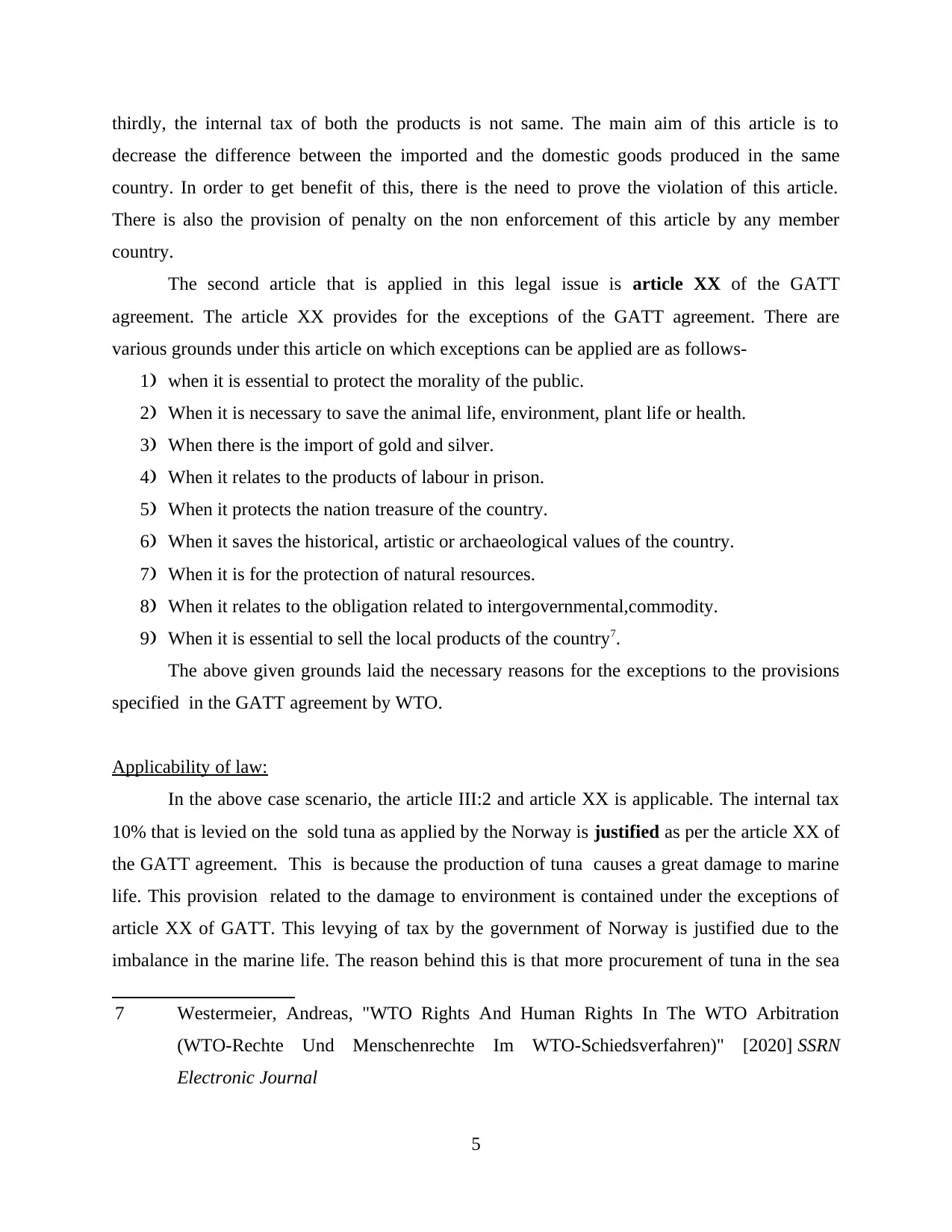
thirdly, the internal tax of both the products is not same. The main aim of this article is to
decrease the difference between the imported and the domestic goods produced in the same
country. In order to get benefit of this, there is the need to prove the violation of this article.
There is also the provision of penalty on the non enforcement of this article by any member
country.
The second article that is applied in this legal issue is article XX of the GATT
agreement. The article XX provides for the exceptions of the GATT agreement. There are
various grounds under this article on which exceptions can be applied are as follows-
1) when it is essential to protect the morality of the public.
2) When it is necessary to save the animal life, environment, plant life or health.
3) When there is the import of gold and silver.
4) When it relates to the products of labour in prison.
5) When it protects the nation treasure of the country.
6) When it saves the historical, artistic or archaeological values of the country.
7) When it is for the protection of natural resources.
8) When it relates to the obligation related to intergovernmental,commodity.
9) When it is essential to sell the local products of the country7.
The above given grounds laid the necessary reasons for the exceptions to the provisions
specified in the GATT agreement by WTO.
Applicability of law:
In the above case scenario, the article III:2 and article XX is applicable. The internal tax
10% that is levied on the sold tuna as applied by the Norway is justified as per the article XX of
the GATT agreement. This is because the production of tuna causes a great damage to marine
life. This provision related to the damage to environment is contained under the exceptions of
article XX of GATT. This levying of tax by the government of Norway is justified due to the
imbalance in the marine life. The reason behind this is that more procurement of tuna in the sea
7 Westermeier, Andreas, "WTO Rights And Human Rights In The WTO Arbitration
(WTO-Rechte Und Menschenrechte Im WTO-Schiedsverfahren)" [2020] SSRN
Electronic Journal
5
decrease the difference between the imported and the domestic goods produced in the same
country. In order to get benefit of this, there is the need to prove the violation of this article.
There is also the provision of penalty on the non enforcement of this article by any member
country.
The second article that is applied in this legal issue is article XX of the GATT
agreement. The article XX provides for the exceptions of the GATT agreement. There are
various grounds under this article on which exceptions can be applied are as follows-
1) when it is essential to protect the morality of the public.
2) When it is necessary to save the animal life, environment, plant life or health.
3) When there is the import of gold and silver.
4) When it relates to the products of labour in prison.
5) When it protects the nation treasure of the country.
6) When it saves the historical, artistic or archaeological values of the country.
7) When it is for the protection of natural resources.
8) When it relates to the obligation related to intergovernmental,commodity.
9) When it is essential to sell the local products of the country7.
The above given grounds laid the necessary reasons for the exceptions to the provisions
specified in the GATT agreement by WTO.
Applicability of law:
In the above case scenario, the article III:2 and article XX is applicable. The internal tax
10% that is levied on the sold tuna as applied by the Norway is justified as per the article XX of
the GATT agreement. This is because the production of tuna causes a great damage to marine
life. This provision related to the damage to environment is contained under the exceptions of
article XX of GATT. This levying of tax by the government of Norway is justified due to the
imbalance in the marine life. The reason behind this is that more procurement of tuna in the sea
7 Westermeier, Andreas, "WTO Rights And Human Rights In The WTO Arbitration
(WTO-Rechte Und Menschenrechte Im WTO-Schiedsverfahren)" [2020] SSRN
Electronic Journal
5
Paraphrase This Document
Need a fresh take? Get an instant paraphrase of this document with our AI Paraphraser
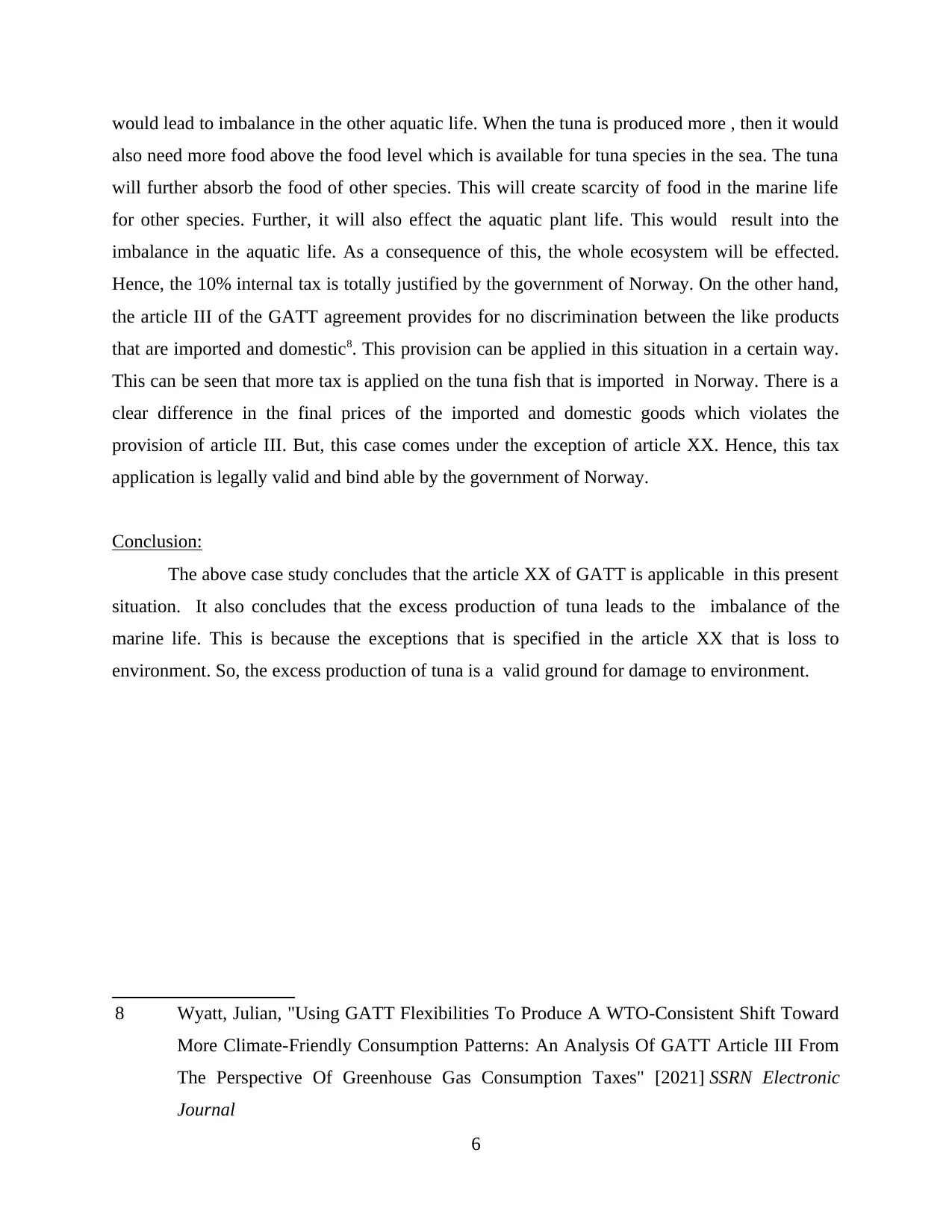
would lead to imbalance in the other aquatic life. When the tuna is produced more , then it would
also need more food above the food level which is available for tuna species in the sea. The tuna
will further absorb the food of other species. This will create scarcity of food in the marine life
for other species. Further, it will also effect the aquatic plant life. This would result into the
imbalance in the aquatic life. As a consequence of this, the whole ecosystem will be effected.
Hence, the 10% internal tax is totally justified by the government of Norway. On the other hand,
the article III of the GATT agreement provides for no discrimination between the like products
that are imported and domestic8. This provision can be applied in this situation in a certain way.
This can be seen that more tax is applied on the tuna fish that is imported in Norway. There is a
clear difference in the final prices of the imported and domestic goods which violates the
provision of article III. But, this case comes under the exception of article XX. Hence, this tax
application is legally valid and bind able by the government of Norway.
Conclusion:
The above case study concludes that the article XX of GATT is applicable in this present
situation. It also concludes that the excess production of tuna leads to the imbalance of the
marine life. This is because the exceptions that is specified in the article XX that is loss to
environment. So, the excess production of tuna is a valid ground for damage to environment.
8 Wyatt, Julian, "Using GATT Flexibilities To Produce A WTO-Consistent Shift Toward
More Climate-Friendly Consumption Patterns: An Analysis Of GATT Article III From
The Perspective Of Greenhouse Gas Consumption Taxes" [2021] SSRN Electronic
Journal
6
also need more food above the food level which is available for tuna species in the sea. The tuna
will further absorb the food of other species. This will create scarcity of food in the marine life
for other species. Further, it will also effect the aquatic plant life. This would result into the
imbalance in the aquatic life. As a consequence of this, the whole ecosystem will be effected.
Hence, the 10% internal tax is totally justified by the government of Norway. On the other hand,
the article III of the GATT agreement provides for no discrimination between the like products
that are imported and domestic8. This provision can be applied in this situation in a certain way.
This can be seen that more tax is applied on the tuna fish that is imported in Norway. There is a
clear difference in the final prices of the imported and domestic goods which violates the
provision of article III. But, this case comes under the exception of article XX. Hence, this tax
application is legally valid and bind able by the government of Norway.
Conclusion:
The above case study concludes that the article XX of GATT is applicable in this present
situation. It also concludes that the excess production of tuna leads to the imbalance of the
marine life. This is because the exceptions that is specified in the article XX that is loss to
environment. So, the excess production of tuna is a valid ground for damage to environment.
8 Wyatt, Julian, "Using GATT Flexibilities To Produce A WTO-Consistent Shift Toward
More Climate-Friendly Consumption Patterns: An Analysis Of GATT Article III From
The Perspective Of Greenhouse Gas Consumption Taxes" [2021] SSRN Electronic
Journal
6
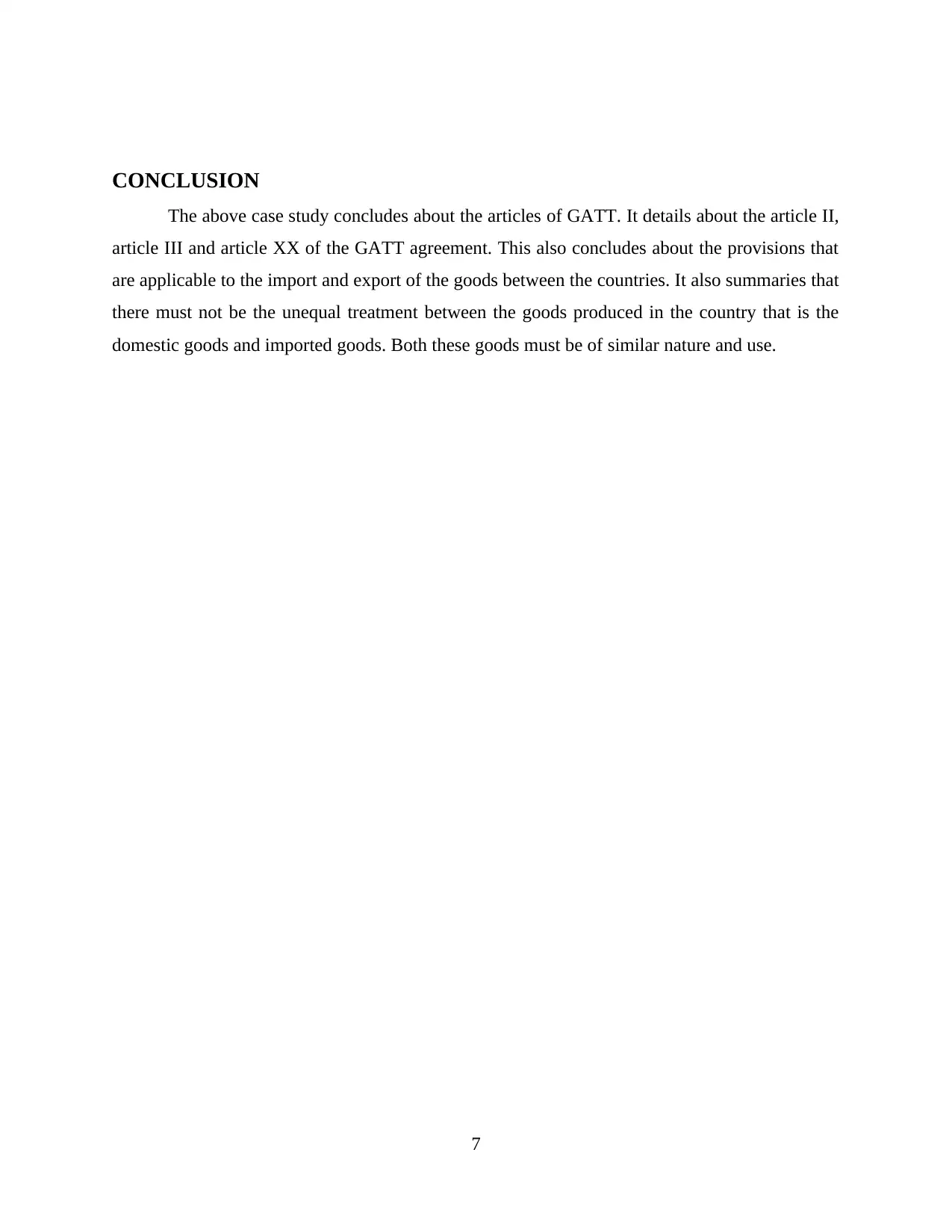
CONCLUSION
The above case study concludes about the articles of GATT. It details about the article II,
article III and article XX of the GATT agreement. This also concludes about the provisions that
are applicable to the import and export of the goods between the countries. It also summaries that
there must not be the unequal treatment between the goods produced in the country that is the
domestic goods and imported goods. Both these goods must be of similar nature and use.
7
The above case study concludes about the articles of GATT. It details about the article II,
article III and article XX of the GATT agreement. This also concludes about the provisions that
are applicable to the import and export of the goods between the countries. It also summaries that
there must not be the unequal treatment between the goods produced in the country that is the
domestic goods and imported goods. Both these goods must be of similar nature and use.
7
⊘ This is a preview!⊘
Do you want full access?
Subscribe today to unlock all pages.

Trusted by 1+ million students worldwide
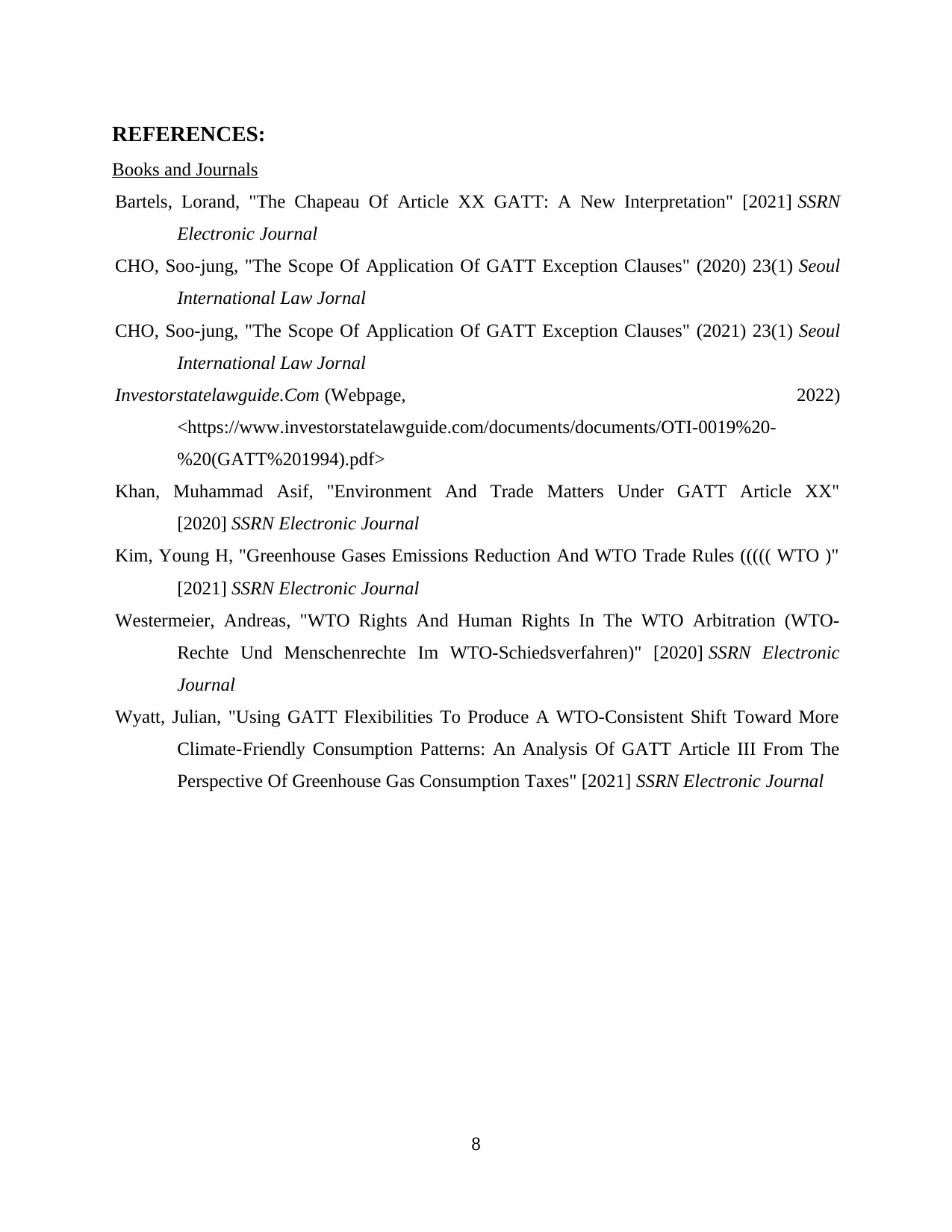
REFERENCES:
Books and Journals
Bartels, Lorand, "The Chapeau Of Article XX GATT: A New Interpretation" [2021] SSRN
Electronic Journal
CHO, Soo-jung, "The Scope Of Application Of GATT Exception Clauses" (2020) 23(1) Seoul
International Law Jornal
CHO, Soo-jung, "The Scope Of Application Of GATT Exception Clauses" (2021) 23(1) Seoul
International Law Jornal
Investorstatelawguide.Com (Webpage, 2022)
<https://www.investorstatelawguide.com/documents/documents/OTI-0019%20-
%20(GATT%201994).pdf>
Khan, Muhammad Asif, "Environment And Trade Matters Under GATT Article XX"
[2020] SSRN Electronic Journal
Kim, Young H, "Greenhouse Gases Emissions Reduction And WTO Trade Rules ((((( WTO )"
[2021] SSRN Electronic Journal
Westermeier, Andreas, "WTO Rights And Human Rights In The WTO Arbitration (WTO-
Rechte Und Menschenrechte Im WTO-Schiedsverfahren)" [2020] SSRN Electronic
Journal
Wyatt, Julian, "Using GATT Flexibilities To Produce A WTO-Consistent Shift Toward More
Climate-Friendly Consumption Patterns: An Analysis Of GATT Article III From The
Perspective Of Greenhouse Gas Consumption Taxes" [2021] SSRN Electronic Journal
8
Books and Journals
Bartels, Lorand, "The Chapeau Of Article XX GATT: A New Interpretation" [2021] SSRN
Electronic Journal
CHO, Soo-jung, "The Scope Of Application Of GATT Exception Clauses" (2020) 23(1) Seoul
International Law Jornal
CHO, Soo-jung, "The Scope Of Application Of GATT Exception Clauses" (2021) 23(1) Seoul
International Law Jornal
Investorstatelawguide.Com (Webpage, 2022)
<https://www.investorstatelawguide.com/documents/documents/OTI-0019%20-
%20(GATT%201994).pdf>
Khan, Muhammad Asif, "Environment And Trade Matters Under GATT Article XX"
[2020] SSRN Electronic Journal
Kim, Young H, "Greenhouse Gases Emissions Reduction And WTO Trade Rules ((((( WTO )"
[2021] SSRN Electronic Journal
Westermeier, Andreas, "WTO Rights And Human Rights In The WTO Arbitration (WTO-
Rechte Und Menschenrechte Im WTO-Schiedsverfahren)" [2020] SSRN Electronic
Journal
Wyatt, Julian, "Using GATT Flexibilities To Produce A WTO-Consistent Shift Toward More
Climate-Friendly Consumption Patterns: An Analysis Of GATT Article III From The
Perspective Of Greenhouse Gas Consumption Taxes" [2021] SSRN Electronic Journal
8
1 out of 10
Related Documents
Your All-in-One AI-Powered Toolkit for Academic Success.
+13062052269
info@desklib.com
Available 24*7 on WhatsApp / Email
![[object Object]](/_next/static/media/star-bottom.7253800d.svg)
Unlock your academic potential
Copyright © 2020–2026 A2Z Services. All Rights Reserved. Developed and managed by ZUCOL.





